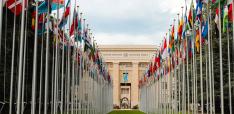Re-imagining Africa’s sovereignty in a digitally interdependent world

Arthur Gwagwa and Beverley Townsend propose a relational concept of the self-determination and non-dominance that aligns with African aspirations and claims in an era of global governance underpinned by digital interdependencies. This is part of a new EGG commentary series exploring how AI’s development is affecting economic, social and political decision-making around the world.
As part of their AI strategies, the United States and China, with support from big technology companies, are pursuing goals to attain strategic autonomy and global dominance in cyberspace.[i] In an attempt to decenter U.S. and Chinese dominance, the European Union (EU) is pursuing the twin goals of attaining digital sovereignty and influencing the global AI regulatory landscape.[ii]
Scholars in the Global South and civil society have responded to this geopolitical positioning and the potential power asymmetries brought about through digital colonialism by re-focusing AI scholarship and advocacy on these emerging issues.[iii] But instead of joining hands with civil society and academics, certain African state actors are asserting their political interests by fervently appropriating calls for digital sovereignty and data localization. In this commentary, we discuss the dangers of domination associated with African pursuit of digital sovereignty and what role governance can play in meeting these challenges.
Domination under the guise of digital sovereignty
Some would argue digital sovereignty rhetoric is justified because the digital age will shape everything from commerce to international relations for the next few decades. In this context, the future of AI development and adoption and the prosperity of states will be (partly) decided by algorithmic control, computational capacity, a skilled workforce, and data ownership. Yet individual pursuit of self-determination can only be realised if the relations in which people stand to one another are non-dominating and are regulated both by the institutions in which they all participate and by ongoing negotiations among them.[iv]
It is thus important to determine how states and technology platforms shape the global AI governance framework, knowledge base, and the concepts that underpin them. Large online platforms are active in multiple African countries like Kenya, South Africa, and Nigeria, where they have a direct and significant impact on internal markets. This market dominance places them in a very powerful position by creating power asymmetries which impose barriers to entry for local corporations. Major states like China and the U.S. are also flexing their economic muscle. For instance, in addition to using a range of public diplomacy instruments to shape China’s image in Africa, China is promoting an economic development narrative in Africa as a core component of its foreign policy there. Components include increased media engagement in Africa and projects developed via the Belt and Road Initiative. These projects, funded by Chinese banks and underwritten by the Chinese government, raise the possibility of unsustainable loans informing a so-called ‘debt trap diplomacy.’ Examples include a gas pipeline in Nigeria, the construction of a high-speed railway between Mombasa and Nairobi, and numerous projects in Uganda, Egypt, and Ethiopia. The difficulty is that China’s strategy is not only to build but, more importantly, to control technological, information, and resource infrastructures.[v]
Simultaneously, major states, with the more or less ambiguous support of digital giants, are also shaping governance principles as part of their strategies for domination and/or autonomy in cyberspace.[vi] China’s current hold on data infrastructures in Africa, means that China is a gatekeeper of consequential decisions in Africa’s social and political realms. Also, in the political realm, U.S companies in Silicon valley wield tremendous power from a distance to determine public life in other countries. In the globalized economic system dominated by large online platforms, major decisions related to resource allocation are taken far from the individual producers and consumers, and the web of causes and justifications is often complex. Further, the digital age is also reviving geopolitical rivalry, in this case, between the U.S. and China. Such rivalries have historically placed Africa at a disadvantage, with global superpowers engaging Africa as “a theatre of operations rather than the focus itself.”
Meanwhile, as previously mentioned, Africa national strategies include certain digital sovereignty measures. For example, several African countries have taken measures to localize their data. Following the launch of the country’s first Chinese-built data centre on 22 June 2022, Senegal's President Macky Sall instructed his government to migrate all government data from foreign servers to a new national data centre. Similarly, certain African countries are pushing for regulations that impede the free flow of digital sequence information, which has created ongoing tensions with the European Seed Association. Such moves have generated multilateral discussions of so-called ‘high-value data’ and how it should, or should not, be shared. Some have argued that using African data without compensation ought to be restricted in an attempt to avoid the emergence of new digital power asymmetries, reminiscent of the colonial past.
Yet, while these are legitimate claims, the difficulty is that African appropriation of decolonization and digital sovereignty narratives is an assertion of domestic political interests as it is a reaction to global developments. For instance, certain ruling governments are re-purposing biometric data for manipulative electoral campaigns and agreeing to massive data collection and management arrangements outside the national democratic accountability structures. Political manipulation of “digital sovereignty” also creates domestic capacities for domination by national governments with the questionable support of foreign data brokers, for instance, by asserting a false sense of ownership and/or national security. This was evidenced recently in Senegal’s Diamniado data center which the ruling government used as a basis for claiming sovereignty when in reality it strengthened China’s economic interests in the country. Particularly susceptible are countries with long histories of human rights abuses and poor records regarding the rule of law, like Zimbabwe and Angola. The combination of strong domestic opposition, ongoing insurgencies, and other security challenges, including popular protests, in these countries makes China’s surveillance technologies increasingly attractive to these governments. This has led to concerns that the pursuit of digital sovereignty can create opportunities for data privacy infringements – particularly, in countries with inadequate data protection laws, oversight, and enforcement.5 Others have gone farther, worrying that political use of digital technologies worsens, rather than improves, existing governance challenges.
The role of governance
Data concentrated in the hands of big technology companies necessitates ‘taking back of control’ and ‘redressing power asymmetries’ as crucial elements of African states’ approach to AI and data governance. Encouragingly, national strategies for digital technology adoption and setting out paths for digital transformation have been developed and implemented in many African countries, including Ghana, Kenya, Rwanda, Uganda, and South Africa. At a continental level, the AU’s Digital Transformation Strategy builds on existing frameworks developed in Africa with the objectives of harnessing digital technologies and innovation to transform African societies and economies, generate economic growth, bridge the digital divide, and support socio-economic development. Similarly, the Declaration on Internet Governance and Development of Africa’s Digital Economy seeks to establish a transparent and inclusive framework of internet governance. This framework proposes principles, including freedom of expression, respect and protection of private life, universal access and technical interoperability, and the ethics and respect of cultural and linguistic diversity in cyberspace, as the basis for internet governance.
However, political fragmentation, a lack of strategic technology and data infrastructure autonomy, and a weak market position all continue to hinder Africans’ position to influence global regulatory norms. As Christopher Gore writes about climate change negotiations, “The large number of independent African states and their diverse social, political, economic, and ecological conditions put the subcontinent at a collective disadvantage in bargaining, as it is nearly impossible for governments to present a unified position in negotiations.” This is similarly evidenced in digital governance. African states have been slow to exercise collective political will and to move ahead with digital and data governance measures. This is reflected in the region’s collective lack of political will to ratify treaties. Although the 14th ratification by the Democratic Republic of the Congo brings the number of ratifications closer to the required 15, it has been a long and slow process. The fragmented approach is also seen in the lack of a common approach to cybercrime. While certain African countries do not yet have cybercrime laws, other countries have ratified the Council of Europe cybercrime and data protection conventions. This fragmentation will affect Africa's capacity to influence global digital rules and will facilitate a weak market position in the global digitally interdependent economies, making it prone to domination by the powers that shape such rules.
At the multilateral level, it is thus perhaps unsurprising that conversations on AI governance continue to reflect the perspectives of a few industrialized economies while the unique challenges of the Global South – from access to digital infrastructure and institutional capacities, to societal norms and cultural practices – remain outside governance discussions. For instance, a 2019 survey shows that, despite claims of universality, most AI ethics principles and their guidelines are developed by stakeholders based in economically developed, mostly Western countries like the U.S and those from within the EU.
What next?
There is an urgent need that perspectives and insights around digital and AI deployment in the Global South inform global governance narratives, or we stand to misalign AI expectations and requirements with the needs of a great many people of the world. We suggest the following:
- Engage in digital constitutionalism: Adapting core constitutional values to the requirements of the digital society in Africa can provide a scaffold upon which good AI governance and practice can be constructed. It reimagines and reframes rights and powers in the digital society and plays a pivotal role in Africa, where constitutional values are increasingly under threat by ubiquitous forms of surveillance, power, and control.
- Strengthen existing collaborations: African states, acting collectively though the African Union, should use their collective agency to diversify, but also strengthen, their respective existing collaborations with the EU in the area of cyber governance and with the U.S. on the inclusion of Africa’s languages in the digital. Doing so can help build Africa’s AI infrastructure, skills, and data management capacities. It can help Africans push for a governance framework that, like the EU data protection initiatives and AI regulatory proposals, are ethically desirable and normatively justified. And it can help Africans – acting through the African Union and with the assistance of the EU – to decenter the significant and influential position and presence China and Russia are adopting in the digital space in Africa.
- Create appropriate and contextually-relevant policies: Approaches to AI regulatory frameworks differ, sometimes significantly, between countries. (Take the different proposed approaches between the EU and the UK, for example). While core ethical values guiding policy frameworks on responsible AI can be shared between and across applications and locations, they must be implemented in accordance with particular contexts. As a result, some aspects of the principles may not apply – or will apply differently – in Africa. In this context, the African Union should continue to pursue multilateral and intra-African approaches to AI governance which address local specificities, protect human rights, and advance digital reformation measures on the African continent.
- Promote inclusive governance: The United Nations and others can also assist through democratic channels that go beyond the current state-centric model proposed by China and Russia, by involving commercial enterprises and civil society to reframe and implement ‘digital sovereignty’ in Africa. Doing so is crucial for establishing useful governance principles and articulating how these values can be applied. It will also ensure that AI standards applied to Africa meet the democratic requirements of accountability. The role of accountability is vital and stands to verify compliance with substantive normative principles of good data and technology use including, amongst others, values of privacy, transparency, explainability, human oversight, and fairness.
In conclusion, we propose a relational concept of the self-determination and non-dominance for African peoples. This, we suggest, aligns with African aspirations and claims in the era of global governance underpinned by digital interdependencies. It is also one more likely to accrue benefits for Africans in a time of increased digital and geopolitical struggle.
Arthur Gwagwa is based at the Utrecht University Ethics Institute and his research interests are on the geopolitics and intercultural ethics of AI.
Bev Townsend, PhD, is a South African researcher who works in the law and ethics of data and digital technologies, and in AI and resilient autonomous systems at the University of York, England.
Photo by Ketut Subiyanto
Notes
[i] Theodore Christakis, ‘European Digital Sovereignty’: Successfully Navigating Between the “Brussels Effect” and Europe’s Quest for Strategic Autonomy, Multidisciplinary Institute on Artificial Intelligence/Grenoble Alpes Data Institute, e-book, December 2020 Available at https://ssrn.com/abstract=3748098; https://airegulation.com.
[ii] Anu Bradford, ‘The Brussels Effect, How the European Union Influences the World’, (2020)
[iii] Sabelo Ndlovu-Gatsheni, “Discourses of Decolonization/Decoloniality”. Papers on Language and Literature, Vol.55, No.3, 2019, pp. 201-300. Available at https://www.blacfoundation.org/pdf/Ndlovu-Gatsheni-16.pdf; Abeba Birhane, ‘Algorithmic injustice: a relational ethics approach’, Patterns, Volume 2, Issue 2, 2021.
[iv] Iris Marion Young, ‘Self-Determination as Principle of Justice’. Philosophical Forum_ (1979). 11 (1):30.
[v] Elenore Pauwels, ‘Artificial Intelligence and Data Capture Technologies in Violence and
Conflict Prevention Opportunities and Challenges for the International Community’, (2020) Global Center on Cooperative Security.
[vi] Christakis, ‘European Digital Sovereignty’.


